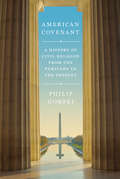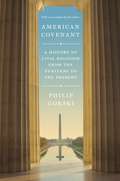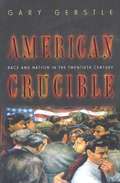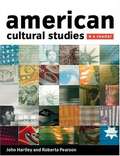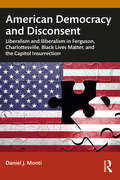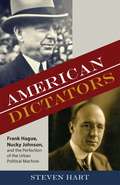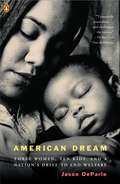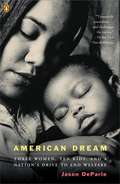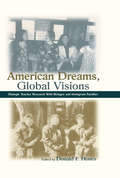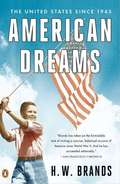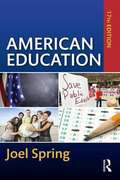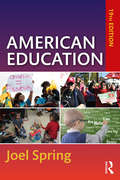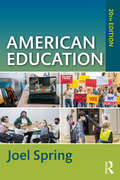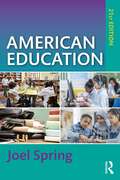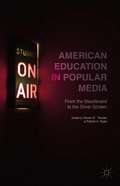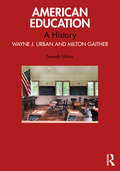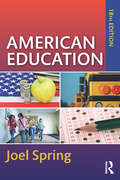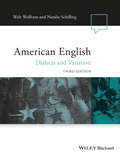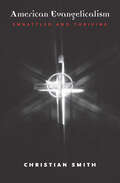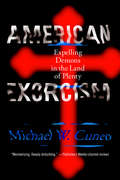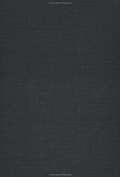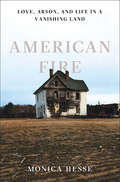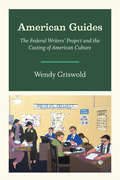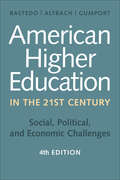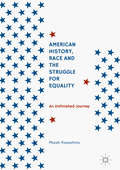- Table View
- List View
American Covenant: A History of Civil Religion from the Puritans to the Present
by Philip GorskiWas the United States founded as a Christian nation or a secular democracy? Neither, argues Philip Gorski in American Covenant. What the founders actually envisioned was a prophetic republic that would weave together the ethical vision of the Hebrew prophets and the Western political heritage of civic republicanism. In this ambitious book, Gorski shows why this civil religious tradition is now in peril—and with it the American experiment.Gorski traces the historical development of prophetic republicanism from the Puritan era to the present day. He provides close readings of thinkers such as John Winthrop, Thomas Jefferson, Frederick Douglass, W.E.B. Du Bois, and Hannah Arendt, along with insightful portraits of recent and contemporary religious and political leaders such as Jerry Falwell, Pat Robertson, Ronald Reagan, George W. Bush, and Barack Obama. Gorski shows how the founders' original vision for America is threatened by an internecine struggle between two rival traditions, religious nationalism and radical secularism. Religious nationalism is a form of militaristic hyperpatriotism that imagines the United States as a divine instrument in the final showdown between good and evil. Radical secularists fervently deny the positive contributions of the Judeo-Christian tradition to the American project and seek to remove all traces of religious expression from the public square. Gorski offers an unsparing critique of both, demonstrating how half a century of culture war has drowned out the quieter voices of the vital center.American Covenant makes the compelling case that if we are to rebuild that vital center, we must recover the civil religious tradition on which the republic was founded.
American Covenant: A History of Civil Religion from the Puritans to the Present
by Philip GorskiThe long battle between exclusionary and inclusive versions of the American storyWas America founded as a Christian nation or a secular democracy? Neither, argues Philip Gorski in American Covenant. What the founders envisioned was a prophetic republic that would weave together the ethical vision of the Hebrew prophets and the Western political heritage of civic republicanism. In this eye-opening book, Gorski shows why this civil religious tradition is now in peril—and with it the American experiment.American Covenant traces the history of prophetic republicanism from the Puritan era to today, providing insightful portraits of figures ranging from John Winthrop and W.E.B. Du Bois to Jerry Falwell, Ronald Reagan, and Barack Obama. Featuring a new preface by the author, this incisive book demonstrates how half a century of culture war has drowned out the quieter voices of the vital center, and demonstrates that if we are to rebuild that center, we must recover the civil religious tradition on which the republic was founded.
American Crucible: Race and Nation in the Twentieth Century
by Gary GerstleThis sweeping history of twentieth-century America follows the changing and often conflicting ideas about the fundamental nature of American society: Is the United States a social melting pot, as our civic creed warrants, or is full citizenship somehow reserved for those who are white and of the "right" ancestry? Gary Gerstle traces the forces of civic and racial nationalism, arguing that both profoundly shaped our society. After Theodore Roosevelt led his Rough Riders to victory during the Spanish American War, he boasted of the diversity of his men's origins- from the Kentucky backwoods to the Irish, Italian, and Jewish neighborhoods of northeastern cities. Roosevelt's vision of a hybrid and superior "American race," strengthened by war, would inspire the social, diplomatic, and economic policies of American liberals for decades. And yet, for all of its appeal to the civic principles of inclusion, this liberal legacy was grounded in "Anglo-Saxon" culture, making it difficult in particular for Jews and Italians and especially for Asians and African Americans to gain acceptance. Gerstle weaves a compelling story of events, institutions, and ideas that played on perceptions of ethnic/racial difference, from the world wars and the labor movement to the New Deal and Hollywood to the Cold War and the civil rights movement. We witness the remnants of racial thinking among such liberals as FDR and LBJ; we see how Italians and Jews from Frank Capra to the creators of Superman perpetuated the New Deal philosophy while suppressing their own ethnicity; we feel the frustrations of African-American servicemen denied the opportunity to fight for their country and the moral outrage of more recent black activists, including Martin Luther King, Jr. , Fannie Lou Hamer, and Malcolm X. Gerstle argues that the civil rights movement and Vietnam broke the liberal nation apart, and his analysis of this upheaval leads him to assess Reagan's and Clinton's attempts to resurrect nationalism. Can the United States ever live up to its civic creed? For anyone who views racism as an aberration from the liberal premises of the republic, this book is must reading.
American Cultural Studies: A Reader
by John Hartley Roberta E. Pearson Eva ViethThis provocative new collection shows how the burgeoning field of cultural studies has developed in the U. S. Introducing vital concepts, arguments, theories, and disciplinary debates, American Cultural Studies: A Reader is a panorama of great writing and powerful ideas. It illustrates a uniquely American response to questions of power and identity in the politics of culture. More than forty selections from key figures in "new journalism," cultural theory, the social sciences, humanities, and visual arts are gathered together in seven sections, each one introduced by helpful notes. A general introductory chapter explains the editorial selection and offers a new account of cultural studies and American studies in relation to American culture. The Epilogue suggests new ways--via the Internet--of doing cultural studies and of thinking about America.
American Democracy and Disconsent: Liberalism and Illiberalism in Ferguson, Charlottesville, Black Lives Matter, and the Capitol Insurrection
by Daniel MontiThis volume is a thorough re-examination of civil unrest and discontent in the United States, particularly the intersection of democracy and violence. The work argues that unrest and violence are embedded rituals of social and political "disconsent" and are constitutive features of citizen-based democracy.As such, they are part of how democratic life works: unrest is the eruptive, visible grammar of citizens in a democratic society. Democracy and citizen unrest and violence in the United States are set within a deeper history. The author traces the roots of American democracy – and the rituals of disconsent – to their sources in ancient Mediterranean political society, demonstrating that early democratic theory and practice understood unrest and revolt as morally grounded. Featuring case studies of recent episodes of political and social "disconsent" in the United States, the volume contextualizes the Black Lives Matter protests, unrest around police and institutional violence, and the Capitol insurrection on January 6.Through this, the book provides an important social theoretical lens through which to understand American discontent around racial injustice, political suppression, and citizen disillusionment.
American Dictators: Frank Hague, Nucky Johnson, and the Perfection of the Urban Political Machine (Rivergate Regionals Collection)
by Steven HartAmerican Dictators is the dual biography of two of America's greatest political bosses: Frank Hague and Enoch "Nucky" Johnson. The book shows Hague and Johnson at the peak of their power and the strength of their political machines during the years of Prohibition and the Great Depression. Steven Hart describes how both men used their influence to benefit and punish the local citizenry, amass huge personal fortunes, and sometimes collaborate to trounce their enemies.
American Dream
by Jason DeparleIn this definitive work, two-time Pulitzer finalist Jason DeParle cuts between the mean streets of Milwaukee and the corridors of Washington to produce a masterpiece of literary journalism. At the heart of the story are three cousins whose different lives follow similar trajectories. Leaving welfare, Angie puts her heart in her work. Jewell bets on an imprisoned man. Opal guards a tragic secret that threatens her kids and her life. DeParle traces their family history back six generations to slavery and weaves poor people, politicians, reformers, and rogues into a spellbinding epic. With a vivid sense of humanity, DeParle demonstrates that although we live in a country where anyone can make it, generation after generation some families don't. To read American Dream is to understand why.
American Dream: Three Women, Ten Kids, and a Nation's Drive to End Welfare
by Jason DeparleIn this definitive work, two-time Pulitzer finalist Jason DeParle cuts between the mean streets of Milwaukee and the corridors of Washington to produce a masterpiece of literary journalism. At the heart of the story are three cousins whose different lives follow similar trajectories. Leaving welfare, Angie puts her heart in her work. Jewell bets on an imprisoned man. Opal guards a tragic secret that threatens her kids and her life. DeParle traces their family history back six generations to slavery and weaves poor people, politicians, reformers, and rogues into a spellbinding epic. With a vivid sense of humanity, DeParle demonstrates that although we live in a country where anyone can make it, generation after generation some families don't. To read American Dream is to understand why.
American Dreams, Global Visions: Dialogic Teacher Research With Refugee and Immigrant Families (Sociocultural, Political, and Historical Studies in Education)
by Donald F. HonesThis book presents the struggle for dialogue and understanding between teachers and refugee and immigrant families, in their own words. Forging a stronger connection between teachers, newcomers, and their families is one of the greatest challenges facing schools in the United States. Teachers need to become familiar with the political, economic, and sociocultural contexts of these newcomers' lives, and the role of the U.S. in influencing these contexts in positive and negative ways. The important contribution of American Dreams, Global Visions is to bring together global issues of international politics and economics and their effects on migration and refugee situations, national issues of language and social policy, and local issues of education and finding ways to live together in an increasingly diverse society. Narratives of four immigrant families in the United States (Hmong, Mexican, Assyrian/Kurdish, Kosovar) and the teacher-researchers who are coming to know them form the heart of this work. The narratives are interwoven with data from the research and critical analysis of how the narratives reflect and embody local, national, and global contexts of power. The themes that are developed set the stage for critical dialogues about culture, language, history, and power. Central to the book is a rationale and methodology for teachers to conduct dialogic research with refugees and immigrants--research encompassing methods as once ethnographic, participatory, and narrative--which seeks to engage researchers and participants in dialogues that shed light on economic, political, social, and cultural relationships; to represent these relationships in texts; and to extend these dialogues to promote broader understanding and social justice in schools and communities. American Dreams, Global Visions will interest teachers, social workers, and others who work with immigrants and refugees; researchers, professionals, and students across the fields of education, language and culture, ethnic studies, American studies, and anthropology; and members of the general public interested in learning more about America's most recent newcomers. It is particularly appropriate for courses in foundations of education, multicultural education, comparative education, language and culture, and qualitative research.
American Dreams: The United States Since 1945
by H. W. BrandsTHE STORY OF OUR NATION FROM THE A - BOMB TO THE iPHONE <p><p>For a brief moment in 1945, America stood at its apex, looking back on victory not only against the Axis powers but also against the Great Depression, and looking ahead to a seemingly limitless future. What we've done in the six decades since is a vitally important and fascinating topic that has rarely been tackled in one volume. Covering the highs and lows, politics to pop culture, H. W. Brands, one of today's preeminent historians, creates a character-driven narrative that chronicles the great themes and events that have driven America-a still unfolding legacy of dreams born out of a global cataclysm. <p> 'A crisp, balanced account of America. ' - THE ECONOMIST <p> 'Brands weaves together keen political history with anecdote and marvellous sense of place to produce a vivid tableau. ' - THE BOSTON GLOBE <p> 'Brands knows how to write narrative and how to make the complex comprehensible. ' - JONATHAN YARDLEY, THE WASHINGTON POST BOOK WORLD
American Education
by Joel SpringJoel Spring's American Education introduces readers to the historical, political, social, and legal foundations of education and to the profession of teaching in the United States. In his signature straightforward and concise approach to describing complex issues, Spring illuminates events and topics and that are often overlooked or whitewashed, giving students the opportunity to engage in critical thinking about education. In this edition he looks closely at the global context of education in the U.S. Featuring current information and challenging perspectives--with scholarship that is often cited as a primary source, students will come away from this clear, authoritative text informed on the latest topics, issues, and data and with a strong knowledge of the forces shaping of the American educational system. Changes in the 17th Edition include new and updated material and statistics on economic theories related to "skills" education and employability the conflict between a skills approach and cultural diversity political differences regarding education among the Republican, Democratic, Libertarian and Green parties social mobility and equality of opportunity as related to schooling global migration and student diversity in US schools charter schools and home schooling
American Education (Sociocultural, Political, and Historical Studies in Education)
by Joel SpringFeaturing current information and challenging perspectives on the latest issues and forces shaping the American educational system—with scholarship that is often cited as a primary source—Joel Spring introduces readers to the historical, political, social, and legal foundations of education and to the profession of teaching in the United States. In his signature straightforward, concise approach to describing complex issues, he illuminates events and topics that are often overlooked or whitewashed, giving students the opportunity to engage in critical thinking about education. Students come away informed on the latest topics, issues, and data and with a strong knowledge of the forces shaping the American educational system. Thoroughly updated throughout, the new edition of this clear, authoritative text remains fresh and up-to-date, reflecting the many changes in education that have occurred since the publication of the previous edition. Topics and issues addressed and analyzed include: • The decline of the Common Core State Standards, particularly as result of a Republican-controlled administration currently in place• Increasing emphasis on for-profit education, vouchers, charter schools, and free-market competition between schools, expected to surge with the appointment of the new U.S. Secretary of Education Betsy DeVos • Current debates about immigration and "Dreamers"—new statistics on immigrant education, discussion of education proposals to accommodate the languages, cultures, and religions of newly arrived immigrants• New education statistics on school enrollments, dropouts, education and income, school segregation, charter schools, and home languages• The purposes of education as presented in the 2016 platforms of the Republican, Democratic, Green, and Libertarian parties• Discussions around transgender students
American Education (Sociocultural, Political, and Historical Studies in Education)
by Joel SpringFeaturing current information and challenging perspectives on the latest issues and forces shaping the American educational system—with scholarship that is often cited as a primary source—Joel Spring introduces readers to the historical, political, social and legal foundations of education and to the profession of teaching in the United States. In his signature straightforward, concise approach to describing complex issues, he illuminates events and topics that are often overlooked or whitewashed, giving students the opportunity to engage in critical thinking about education. Students come away informed on the latest topics, issues and data and with a strong knowledge of the forces shaping the American educational system. Thoroughly updated throughout, the 20th edition of this clear, authoritative text remains fresh and up to date, reflecting the many changes in education that have occurred since the publication of the previous edition, such as: The effects of the pandemic on schools, teachers, students, learning and social goals The latest U.S. Department of Education guidelines for school prayer, regulations on sexual harassment and Title IX and guidelines for writing IEPs Expanded discussion of institutional racism Coverage relating to transgender youth and athletics
American Education (Sociocultural, Political, and Historical Studies in Education)
by Joel SpringFeaturing current information and challenging perspectives on the latest issues and forces shaping the American educational system—with scholarship that is often cited as a primary source—Joel Spring introduces readers to the historical, political, social and legal foundations of education and to the profession of teaching in the United States. In his signature straightforward, concise approach to describing complex issues, he illuminates events and topics that are often overlooked or whitewashed, giving students the opportunity to engage in critical thinking about education. Students come away informed on the latest topics, issues and data and with a strong knowledge of the forces shaping the American educational system. Updated throughout, the 21st edition of this clear, authoritative text remains fresh and up-to-date, reflecting the many changes in education that have occurred since the publication of the previous edition. New coverage includes: Discussion of “culture wars” and critical race theory Parental rights versus the goals of common education LGBTQIA+ students’ rights Discussion of the current administration’s educational policies
American Education in Popular Media
by Sevan G. Terzian Patrick A. RyanAmerican Education in Popular Media examines how popular media including mass magazines, radio, film, and television have represented schooling in the United States over the course of the twentieth century. Historical essays explore prevalent portrayals of students and professional educators while addressing contested purposes of schooling in American society. Terzian and Ryan highlight the educative and normative dimensions of popular media in outlining roles for teachers, students, and administrators at educational institutions ranging from elementary schools to universities.
American Education: A History
by Wayne J. Urban Milton GaitherAmerican Education: A History, Seventh Edition is a comprehensive, highly regarded history of American education from precolonial times to the present.Chronologically organized, the new edition provides an objective overview of each major period in the development of American education, setting the discussion against the broader background of national and world events. In addition to its in-depth exploration of Native American traditions (including education) prior to colonization, it also offers strong, ongoing coverage of minorities and women. Features for the seventh edition include: Every chapter extensively revised to incorporate the most recent historical scholarship, to increase readability, and to make the content relevant for today’s educators. Chapter overviews and end-of-chapter reflection questions to aid comprehension and discussion. Updated and expanded coverage of Native American education, the role of women progressives in schools, rural schooling, public education, minority populations, and much more. Brand new topics, such as education policy under Trump and Biden, the impact of the COVID-19 pandemic on schools, student mental health, critical race theory, culturally responsive education, and textbook censorship. This much-anticipated seventh edition is essential reading for undergraduate and graduate History of Education courses.
American Education: From The Puritans To The Trump Era (Sociocultural, Political, and Historical Studies in Education)
by Joel SpringFeaturing current information and challenging perspectives on the latest issues and forces shaping the American educational system—with scholarship that is often cited as a primary source, Joel Spring introduces readers to the historical, political, social, and legal foundations of education and to the profession of teaching in the United States. In his signature straightforward, concise approach to describing complex issues, he illuminates events and topics that are often overlooked or whitewashed, giving students the opportunity to engage in critical thinking about education. Students come away informed on the latest topics, issues, and data and with a strong knowledge of the forces shaping the American educational system. Thoroughly updated throughout, the 18th edition of this clear, authoritative text remains fresh and up to date, reflecting the many changes in education that have occurred since the publication of the previous edition. Topics and issues addressed and analyzed include • The decline of the Common Core State Standards, particularly as result of a Republican-controlled administration currently in place • Increasing emphasis on for-profit education, vouchers, charter schools and free-market competition between schools, expected to surge with the appointment of the new U.S. Secretary of Education Betsy DeVos • Current debates about immigration and "Dreamers"—new statistics on immigrant education, discussion of education proposals to accommodate the languages, cultures and religions of newly arrived immigrants • New education statistics on school enrollments, dropouts, education and income, school segregation, charter schools and home languages • The purposes of education as presented in the 2016 platforms of the Republican, Democratic, Green, and Libertarian parties • Discussions around transgender students
American English: Dialects and Variation (Language in Society #45)
by Natalie Schilling Walt WolframThe new edition of this classic text chronicles recent breakthrough developments in the field of American English, covering regional, ethnic, and gender-based differences. Now accompanied by a companion website with an extensive array of sound files, video clips, and other online materials to enhance and illustrate discussions in the text Features brand new chapters that cover the very latest topics, such as Levels of Dialect, Regional Varieties of English, Gender and Language Variation, The Application of Dialect Study, and Dialect Awareness: Extending Application, as well as new exercises with online answers Updated to contain dialect samples from a wider array of US regions Written for students taking courses in dialect studies, variationist sociolinguistics, and linguistic anthropology, and requires no pre-knowledge of linguistics Includes a glossary and extensive appendix of the pronunciation, grammatical, and lexical features of American English dialects
American Evangelicalism: Embattled and Thriving
by Paul Kennedy Michael Emerson Christian Smith Sally Gallagher David Sikkink&“An excellent study of evangelicalism&” from the award-winning sociologist and author of Souls in Transition and Soul Searching (Library Journal). Evangelicalism is one of the strongest religious traditions in America today; twenty million Americans identify themselves with the evangelical movement. Given the modern pluralistic world we live in, why is evangelicalism so popular? Based on a national telephone survey and more than three hundred personal interviews with evangelicals and other churchgoing Protestants, this study provides a detailed analysis of the commitments, beliefs, concerns, and practices of this thriving group. Examining how evangelicals interact with and attempt to influence secular society, this book argues that traditional, orthodox evangelicalism endures not despite, but precisely because of, the challenges and structures of our modern pluralistic environment. This work also looks beyond evangelicalism to explore more broadly the problems of traditional religious belief and practice in the modern world. With its impressive empirical evidence, innovative theory, and substantive conclusions, American Evangelicalism will provoke lively debate over the state of religious practice in contemporary America. &“Based on a three-year study of American evangelicals, Smith takes the pulse of contemporary evangelicalism and offers substantial evidence of a strong heartbeat . . . Evangelicalism is thriving, says Smith, not by being countercultural or by retreating into isolation but by engaging culture at the same time that it constructs, maintains and markets its subcultural identity. Although Smith depends heavily on sociological theory, he makes his case in an accessible and persuasive style that will appeal to a broad audience.&” —Publishers Weekly
American Exorcism: Expelling Demons In The Land Of Plenty
by Michael W. CuneoConducted by officially appointed exorcists or by maverick priests sidestepping Christian sanctions, by evangelical ministers and Episcopal charismatics, the ancient rite of exorcism is flourishing in the new millennium. In New York alone, four priests have, since 1995, officially investigated over 40 cases of suspected demonic possession, the Archdiocese of Chicago has appointed its first full-time exorcist in over 160 years while exorcists have appeared on television, courtesy of the likes of Oprah Winfrey and Larry King. Written with objectivity, insight and a healthy amount of irony, AMERICAN EXORCISM is an inside look at this - to some extraordinary, to others preposterous and to many, terrifying - phenomenon. Having attended over 50 exorcisms in person, and interviewed many of the participants - both the exorcists and those who believed themselves to be possessed - Michael Cuneo explores this netherworld of American, and ergo, British, life, and reflects on the meaning of exorcism in the 21st century, and on the relationship between religious ritual and popular culture. As well recounting in gripping detail the ceremonies he witnessed, he touches on such provocative topics as the 'satanic panics' of the 1980s, repressed memory and ritual abuse. The result is a remarkably revealing, entertaining and fascinating work of cultural commentary.
American Families: A Multicultural Reader
by Stephanie Coontz Maya Parson Gabrielle RaleyThis collection testifies to the extraordinary variety of families in the U.S, revealing that family arrangements have always been diverse and have often been in flux. Case studies describe the wide array of family forms and values, gender roles, and parenting practices.
American Fire: Love, Arson, and Life in a Vanishing Land
by Monica HesseThe arsons started on a cold November midnight and didn’t stop for months. Night after night, the people of Accomack County waited to see which building would burn down next, regarding each other at first with compassion, and later suspicion. Vigilante groups sprang up, patrolling the rural Virginia coast with cameras and camouflage. Volunteer firefighters slept at their stations. The arsonist seemed to target abandoned buildings, but local police were stretched too thin to surveil them all. Accomack was desolate—there were hundreds of abandoned buildings. And by the dozen they were burning.
American Guides: The Federal Writers’ Project and the Casting of American Culture
by Wendy GriswoldIn the midst of the Great Depression, Americans were nearly universally literate--and they were hungry for the written word. Magazines, novels, and newspapers littered the floors of parlors and tenements alike. With an eye to this market and as a response to devastating unemployment, Roosevelt's Works Progress Administration created the Federal Writers' Project. The Project's mission was simple: jobs. But, as Wendy Griswold shows in the lively and persuasive American Guides, the Project had a profound--and unintended--cultural impact that went far beyond the writers' paychecks. Griswold's subject here is the Project's American Guides, an impressively produced series that set out not only to direct travelers on which routes to take and what to see throughout the country, but also to celebrate the distinctive characteristics of each individual state. Griswold finds that the series unintentionally diversified American literary culture's cast of characters--promoting women, minority, and rural writers--while it also institutionalized the innovative idea that American culture comes in state-shaped boxes. Griswold's story alters our customary ideas about cultural change as a gradual process, revealing how diversity is often the result of politically strategic decisions and bureaucratic logic, as well as of the conflicts between snobbish metropolitan intellectuals and stubborn locals. American Guides reveals the significance of cultural federalism and the indelible impact that the Federal Writers' Project continues to have on the American literary landscape.
American Higher Education in the Twenty-First Century: Social, Political, and Economic Challenges
by Michael N. Bastedo, Philip G. Altbach, and Patricia J. GumportAn indispensable reference that everyone concerned with the future of American colleges and universities should acquire.First published in 1999, American Higher Education in the Twenty-First Century offered a comprehensive introduction to the central issues facing American colleges and universities. This thoroughly revised edition brings the classic volume up to date. The contributors have rewritten every chapter to address major changes in higher education, including the rise of organized social movements, the problem of income inequality and stratification, and the growth of for-profit and distance education. Three new chapters cover information technology, community colleges, and teaching and learning.This edition seeks to capture several crucial dynamics in the nexus of higher education and society. Placing higher education within its social and political contexts, the contributors discuss finance, federal and state governance, faculty, students, curriculum, and academic leadership. They also grapple with growing concerns about the future of the academy and reflect more deeply on the racial, ethnic, and socioeconomic diversity within higher education.No other book covers such wide-ranging issues under the broader theme of higher education’s relationship to society. Highly acclaimed and incorporating cutting-edge research, American Higher Education in the Twenty-First Century is now more useful and engaging than ever.Contributors: Michael N. Bastedo, Philip G. Altbach, Patricia J. Gumport, Benjamin Baez, Peter Riley Bahr, Joy Blanchard, Corbin M. Campbell, Melanie E. Corrigan, Peter D. Eckel, Roger L. Geiger, Lawrence E. Gladieux, Sara Goldrick-Rab, Jillian Leigh Gross, D. Bruce Johnstone, Adrianna Kezar, Jacqueline E. King, Aims C. McGuinness, Jr., Michael Mumper, Anna Neumann, Robert M. O’Neil, Laura W. Perna, Gary Rhoades, Roman Ruiz, Lauren Schudde, Sheila Slaughter, Daryl G. Smith
American History, Race and the Struggle for Equality: An Unfinished Journey
by Masaki KawashimaPowerfully synthesizing major currents in the field, this book addresses the issue of inequality across American politics and society, using race as a lens for the exploration of major themes in American history. It considers the concept of race as a social construction, against the background of the historical struggles for "fairness" in a society based on the framework of democracy, whose principle is that majority's consent be necessary for the fulfillment of "justice. " Foregrounding problems of race, capital, and political economy, it particularly examines the connections between race and class, the relationship of slavery and national politics, and the distinctive intellectual framework that Americans have developed to discuss "race. " Offering a detailed account of civil rights legislation, an overview of immigration law and policy, and comprehensive overviews of debates about affirmative action, immigration, and the causes and solutions to racialized urban poverty, this book emphasizes what is distinctive about the United States and offers a unique comparative framework for thinking about America's racial past.
